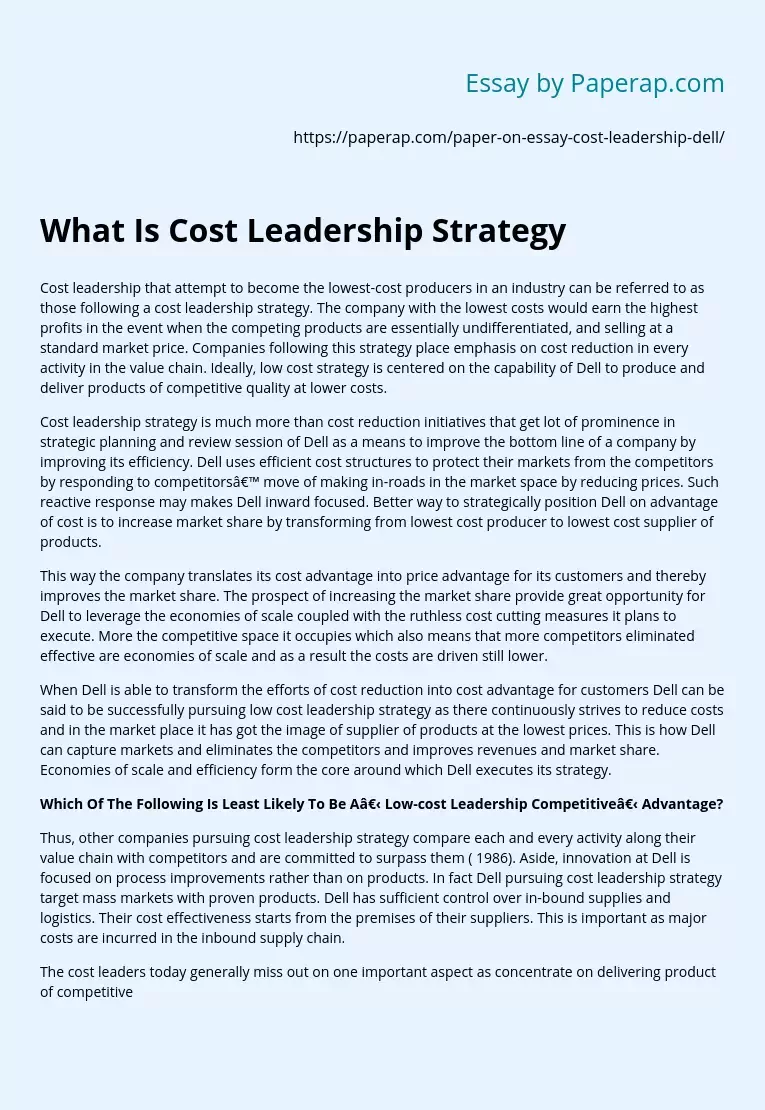What Is Cost Leadership Strategy
Cost leadership that attempt to become the lowest-cost producers in an industry can be referred to as those following a cost leadership strategy. The company with the lowest costs would earn the highest profits in the event when the competing products are essentially undifferentiated, and selling at a standard market price. Companies following this strategy place emphasis on cost reduction in every activity in the value chain. Ideally, low cost strategy is centered on the capability of Dell to produce and deliver products of competitive quality at lower costs.
Cost leadership strategy is much more than cost reduction initiatives that get lot of prominence in strategic planning and review session of Dell as a means to improve the bottom line of a company by improving its efficiency. Dell uses efficient cost structures to protect their markets from the competitors by responding to competitors’ move of making in-roads in the market space by reducing prices. Such reactive response may makes Dell inward focused.
Better way to strategically position Dell on advantage of cost is to increase market share by transforming from lowest cost producer to lowest cost supplier of products.
This way the company translates its cost advantage into price advantage for its customers and thereby improves the market share. The prospect of increasing the market share provide great opportunity for Dell to leverage the economies of scale coupled with the ruthless cost cutting measures it plans to execute. More the competitive space it occupies which also means that more competitors eliminated effective are economies of scale and as a result the costs are driven still lower.
When Dell is able to transform the efforts of cost reduction into cost advantage for customers Dell can be said to be successfully pursuing low cost leadership strategy as there continuously strives to reduce costs and in the market place it has got the image of supplier of products at the lowest prices. This is how Dell can capture markets and eliminates the competitors and improves revenues and market share. Economies of scale and efficiency form the core around which Dell executes its strategy.
Which Of The Following Is Least Likely To Be A Low-cost Leadership Competitive Advantage?
Thus, other companies pursuing cost leadership strategy compare each and every activity along their value chain with competitors and are committed to surpass them ( 1986). Aside, innovation at Dell is focused on process improvements rather than on products. In fact Dell pursuing cost leadership strategy target mass markets with proven products. Dell has sufficient control over in-bound supplies and logistics. Their cost effectiveness starts from the premises of their suppliers. This is important as major costs are incurred in the inbound supply chain.
The cost leaders today generally miss out on one important aspect as concentrate on delivering product of competitive quality at the lowest cost and pass on part of the savings to customers, so obsessed with costs and pricing that rarely do they dissect the customer value proposition. This is prospective area that may provide yet another cost reduction opportunity and at the same time attract potential customers from niche segment. Dell when it compares the value proposition that it offers against the attributes that customers really value, new insights and opportunities may open up (1986).
Investing in cost leadership by riding down the experience curve is a common way to establish Dell’s competitive advantage as success depends on factors that underlie the experience curve. The strategy of cost leadership is associated with stable and predictable environments and correlates with the use of controls. Unfocused strategies make much use of liaison devices. These relationships were likely to be significant for high-performing Dell than those of poor performers.
According to (1985), cost leadership and product differentiation can be pursued simultaneously only under rare conditions as unclear how these strategies can be implemented. Dell pursuing cost-leadership strategy attempts to gain a competitive advantage primarily by reducing its economic costs below its competitors. If cost-leadership strategies can be implemented by numerous Dell in an industry, or if Dell face cost disadvantage in imitating a cost-leadership strategy, then being cost leader does not generate sustained competitive advantage for Dell.
The ability of a valuable cost-leadership competitive strategy to generate competitive advantage depends on that Dell strategy being rare and costly to imitate. Dell should not put all eggs in one basket as far as implementation of its Business Strategy is concerned. Of course Dell need to take advantage of their core competencies but at the same look for opportunities uses their core competencies to broaden their strategy implementation. In Dell’s case they should use core competencies to implement Cost Leadership Strategy by pursuing multi sales channel opportunities.
What Is Cost Leadership Strategy. (2019, Dec 05). Retrieved from https://paperap.com/paper-on-essay-cost-leadership-dell/

